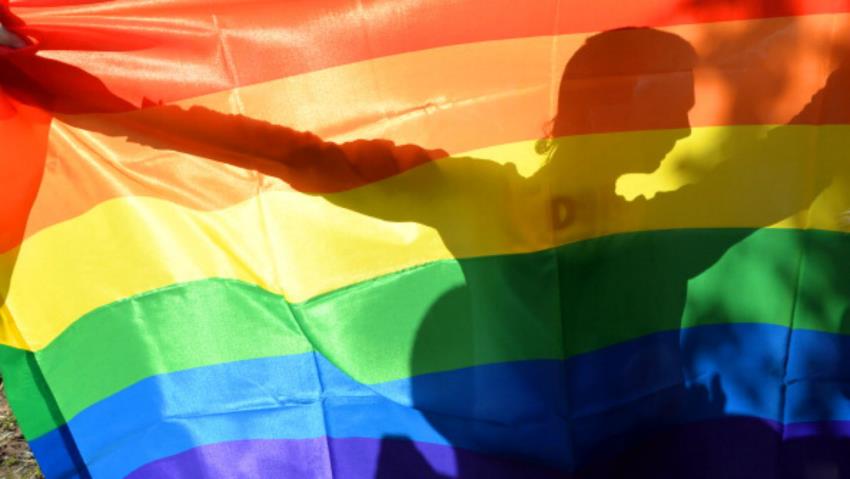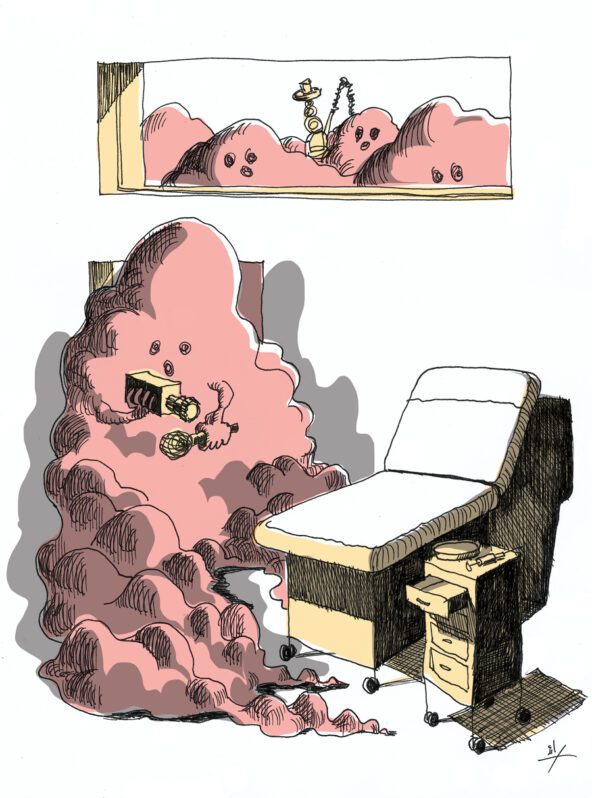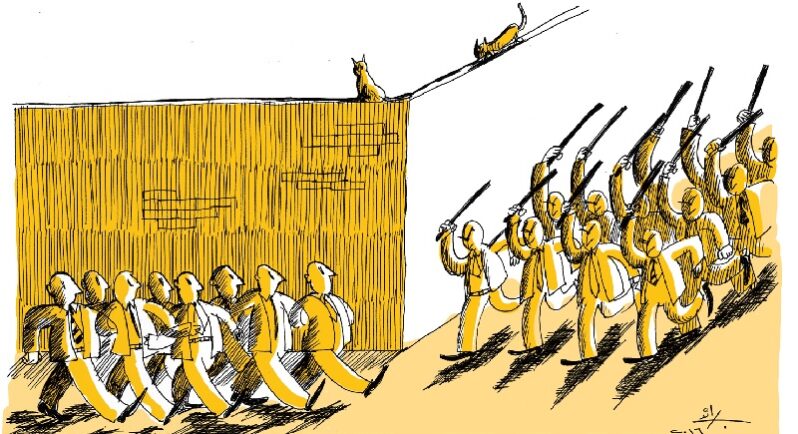The Policies of Suppressing Sexual Rights in Egypt

Following an incident in which a rainbow flag was raised at a Mashrou’ Leila concert in September 2017, the Egyptian authorities mobilized their entire security apparatus and launched a campaign against homosexual citizens. This campaign led to more than 57 arrests.[1] The following month, MPs presented a “criminalization of homosexuality” bill to parliament.[2]
The bill punishes “any two or more people, male or female, who practice queer sexual relations among themselves in any public or private place” with punishments of up to three years of imprisonment.[3] For repeat offenses, the punishment increases to five years. The bill stipulates the same punishment for whoever “abets homosexual relations – whatever they may be – through abetment or facilitation, prepares a place for them to be practiced, or calls upon others to practice them, even if he is not someone who practices them”. The bill goes even further by also criminalizing “publicizing or advertising parties for homosexuals via any means” and “carrying, selling, or manufacturing any sign or symbol for homosexuals”. It also contains a new kind of legislative provision that allows the authorities to publicly “expose” people convicted under it by publishing their names and convictions in two widely circulated national newspapers.[4] This bill is the first of its kind in the history of modern Egyptian legislation to address “homosexuality” specifically and in detail, and criminalizes it with unprecedented punishments.
Homosexuality in Egyptian Law
Currently, homosexuality is being punished under the pretext of committing debauchery [fujur] in a conflation of homosexuality and prostitution. Hence, we shall present the evolution of the provisions concerning prostitution.
In 1885, Khedive Tawfiq issued the “Prostitute Women Inspectorate Regulation”, which obliged prostitutes to register their names or else face punishment for unauthorized practice.[5] This regulation remained in effect until 1949, when government-sanctioned prostitution was abolished by a military decree issued under multiple pressures and demands for liberation from western hegemony.[6]
In 1951, the first law criminalizing commercial sexual relations in all forms was issued.[7] The law devised a new meaning for the term “debauchery” – sex between two people of the same gender – and criminalized the practice.[8] During the political union between Egypt and Syria, Law no. 10 of 1961 on Combating Prostitution (which remains in effect today) was issued containing roughly the same articles. However, its explanatory memorandum contained a clear definition of “debauchery” as “male prostitution”. It must be stressed that when the legislators criminalized “prostitution” and “debauchery”, they meant commercial sexual practice and made no reference whatsoever to consensual sexual practice. Furthermore, the law was issued to fulfill Egypt’s obligations under the Convention for the Suppression of the Traffic in Persons and of the Exploitation of the Prostitution of Others signed in 1950. Hence, it focused more on criminalizing ownership of houses used for debauchery or prostitution, aiding the act in any way, and exploiting female and male minors, than on criminalizing the act itself. Article 9 required that the element of “habituality” be present for a person to be punished for the act, be it prostitution or commercial homosexual relations (“debauchery”).[9] However, the legislators’ use of the term “habituality” without defining it made the element difficult to disprove in many cases and subject to the court’s discretion, creating a state of perpetual confusion.
There was no debate about the need to issue a legislation criminalizing homosexuality until recently. Hence, the current bill is the first legislation to criminalize any consensual extramarital relations in general and homosexual relations in particular.
Anal Exams as a Torture Measure
Given that the law requires “habituality” to prove “the practice of debauchery”, the Public Prosecution has become accustomed to referring most accused persons to the Department of Forensic Medicine for what is termed “anal examination”.[10] In Egypt, the idea of a medical examination to prove the habitual practice of homosexuality traces back to the writings of French doctor Auguste Tardieu,[11] under whom a number of Egyptian doctors apprenticed in the mid-19th century before bringing the practices they learned back to Egypt.[12] The workers in the Department of Forensic Medicine perform these anal examinations on whoever is presumed to be homosexual with or without their consent, even though such examinations violate the sanctity of the body and harm the victims psychologically. Anal examination can also be considered a form of torture per the UN Convention against Torture’s definition as “any act by which severe pain or suffering, whether physical or mental, is intentionally inflicted on a person for such purposes as obtaining from him information or a confession, punishing him for an act he or a third person has committed or is suspected of having committed”.[13] Furthermore, Egyptian legislations have not stipulated performing this medical examination. The Public Prosecution nevertheless employs anal examinations to prove “habituality”, for it and the doctors of the Department of Forensic Medicine believe that anal penetration inevitably leaves signs of damage because it, like rape, is unnatural and therefore causes a rejection reflex.[14]
Doctors handling these examinations also violate the international standards that the medical profession has adopted. The UN’s Principles of Medical Ethics specifically mentions that it is against the ethics of the profession “for physicians to apply their knowledge and skills in order to assist in the interrogation of prisoners and detainees in a manner that may adversely affect the physical or mental health or condition of such prisoners or detainees”.[15]
How Have Judges Handled Cases Pertaining to Sexual Practices Deemed “Unnatural” in Egypt?
Discrimination against homosexuals in Egypt has also affected the right of defendants in homosexuality cases to a just and fair trial. The rulings are issued on the basis of the police’s investigations and the results of the anal examination issued by the Department of Forensic Medicine. Furthermore, most judges have an ideology that stems from the religious beliefs governing society and its culture, which jeopardizes the neutrality of the court and hence the fairness of the trial.
Even though the law criminalized only commercial practices, not consensual ones, the Court of Cassation has sometimes deemed that sex between a man and woman or between two men outside the official, legal framework is “a crime realized by fornicating with people indiscriminately and habitually; it does not have to be the practice of debauchery or prostitution for payment”.[16] Thus, the court categorically criminalized such practices, whether they be commercial or consensual. Yet it deviated from this position with regard to extramarital sex between a man and woman when it acquitted a man charged with lascivious behavior [al-fahsha’] with women.[17] Nevertheless, it has continued to criminalize any homosexual practice, with or without payment.
At the same time, the State Council is engaged with cases of transsexuals. After sex correction surgery from male to female or vice versa, transsexuals take the procedural steps to correct their sex on their national ID cards, which the Civil Status Organization’s employees refuse to alter. Consequently, the transsexuals resort to the administrative judiciary to suspend the decisions not to change their data. Despite the State Council’s flexible handling of legal texts, in these cases, the Court of Administrative Justice [a level of the State Council] relies on the law’s prohibition of the Civil Status Organization from changing citizens’ data except via a committee whose decisions are final.[18] Presentation to this committee in the cases of transsexuals is akin to anal examination in the cases of homosexuals because the committee performs a comprehensive examination of their bodies, all the changes therein, and their IQ even though they submit all official medical examinations verifying their gender identity disorder.[19] Additionally, the court has deemed the exercise of the constitutional right to personal freedom to be contingent on not breaching public order or morals, a restriction not found in any law.[20] In another ruling, the Court of Administrative Justice deemed that abusing or disfiguring the body is a crime punishable by law because the intent of doing so is to alter a creation of nature.[21] Because of these rulings, many transsexuals have been deprived of a normal social life after undergoing corrective surgery.[22]
The Media as One of the State’s Weapons Against Sexual Rights
The Egyptian media is key in shaping public opinion. Hence, the Egyptian state uses it to direct public opinion against sexual minorities, creating social acceptance of all the aforementioned violations. For example, some outlets addressed the raising of a rainbow flag in the Mashrou’ Leila concert with hostility and condemnation, describing those responsible as sexual deviants, devil-worshippers, and perpetrators of crimes of morality who are like the Sodomites and must be killed to rid society of their evils. Others put the topic in a political context, alleging that these sexually “deviant” groups belong to political movements and civil society organizations that participated in the January 25 Revolution, which call for freedom and [supposedly] the breakdown of society.[23] Some media figures considered the flag-raising incident to be indicative of the state’s failure to monitor and prosecute these groups that demean the state and Islamic law, and stigmatize society with shame and moral deviance.
Conclusion
The media’s current treatment of the subject of sexual rights reflects the state’s increasing desire to intervene in individual’s private lives. Hence, the campaign that the state bodies are waging against LGBTQ communities touches the core of the privacy of relationships among human beings in total disregard of the constitutional principles that guarantee personal rights and the international agreements that Egypt has ratified. Moreover, the relevant bodies’ pursuit of LGBTQ groups and defamation of them in the media on moral and religious grounds is part of a broader context in which the government is threatening all Egyptians with intervention in their private lives by, for example, monitoring their online accounts, as well as violating the right to assemble and express opinions freely. These policies also reflect the state’s rejection of all kinds of difference, including the right to be different in one’s private life, and its lack of respect for its duty to establish equality among citizens.
This article is an edited translation from Arabic.
Keywords: LGBTQ rights, Mashrou’ Leila, Egypt, Anal Examination, Torture
[1] See press statement issued by the Egyptian Initiative for Personal Rights on October 4, 2017.
[2] “Na’ib Qanun ‘Tajrim al-Mithliyya’: Lasna Qawm Lut.. wa-ma’i 67 Na’iban”, Zahma website, October 26, 2017.
[3] “Nanshur Mashru’ Tajrim ‘al-Mithliyya al-Jinsiyya’.. al-Sijn min 3 li-5 Sanawat”, Masrawy website, October 25, 2017.
[4] Article 7 of the bill.
[5] See “Ba’d Matalib al-‘Afu al-Duwaliyya bi-Taqnin al-Da’ara.. 6 Mashahid Qabila li-l-‘Awda min Zaman ‘al-Da’ara al-Muqannana’.. al-Rukhsa.. Buyut al-Da’ara.. La’ihat al-Niswa al-‘Ahirat.. Daftar Tasjil al-Baghaya.. wa-Tarkhis al-Da’ara Istimarra fi Misr 118 ‘Amman”, Youm7 website, August 11, 2015.
[6] Military Decree no. 96 of 1949. See Nawal El Saadawi, Prostitution in Egypt, UNESCO, 1985.
[7] Law no. 86 of 1951.
[8] The term “debauchery” [fujur] has a history in Egyptian law:
Article 249 of Egypt’s 1883 criminal code penalized “whoever causes indecent assault by inducing young people of below 18 years to commit fujur and indecency [fisq].” … Additionally, article 350 of the 1883 code penalized “whoever violates in any way the regulations concerning preventing vice and fujur”; article 247 penalized
inter alia “whoever rapes a virgin or non-virgin [female] or practices debauchery with her by force”—a provision which makes it clear that the legal understanding of the term “debauchery” was not, in legal understanding, originally restricted to sexual contact among males.
See Human Rights Watch, In a Time of Torture: The Assault on Justice in Egypt’s Crackdown on Homosexual Conduct, 2004, p. 133.
[9] Article 9 of Law no. 10 of 1961 stipulates that “whoever habitually practices debauchery or prostitution shall be punished with three months to three years of imprisonment and a fine of EGP 25 to 300 in the Egyptian region”.
[10] These examinations usually involve doctors or other medical staff forcibly inserting their fingers or occasionally other instruments into the accused’s anus. See Human Rights Watch, Dignity Debased: Forced Anal Examinations in Homosexuality Prosecutions, 2016.
[11] Auguste Tardieu (1818-1879) is considered one of the 19th century most prominent French forensic doctors. He produced many writings on public health, forensic medicine, prisoners’ medicine, insanity, and detecting sexual abuse of children. See Khaled Fahmy, “Thawabit wa-Huquq Qaws Quzah”, October 17, 2017. See also Human Rights Watch, In a Time of Torture, op. cit.
[12] See Human Rights Watch, In a Time of Torture, op. cit., p. 109:
Dr. Lorna Martin, professor of forensic pathology at the University of Cape Town, South Africa, calls Tardieu’s theory “bizarre and antiquated … rubbish.” She adds “it is impossible to detect chronic anal penetration; the only time the [forensic anal] examination could be of any use is for acute non-consensual anal penetration”.
[13] Egypt ratified the Convention against Torture and Other Cruel, Inhuman or Degrading Treatment or Punishment on June 25, 1986.
[14] See Human Rights Watch, In a Time of Torture, op. cit.
[15] Principles of Medical Ethics relevant to the Role of Health Personnel, particularly Physicians, in the Protection of Prisoners and Detainees against Torture and Other Cruel, Inhuman or Degrading Treatment or Punishment, General Assembly Resolution 37/194 of December 18, 1982.
[16] Court of Cassation ruling no. 683 of judicial year 54, May 12, 1975.
[17] Court of Cassation ruling no. 8838 of judicial year 60, October 13, 1997.
[18] Article 47 of Law no. 143 of 1994 on Personal Status stipulates that “no change or correction may be made to registered civil status records about facts of birth or death or family registration except on the basis of a decision to do so issued by the committee stipulated in the previous article”.
[19] See Court of Administrative Justice ruling on case no. 80419 of judicial year 68, January 24, 2016.
[20] Ibid.
[21] See Court of Administrative Justice ruling on case no. 3867 of judicial year 66, January 23, 2013.
[22] See Supreme Administrative Court ruling on appeal no. 1487 of judicial year 54, June 20, 2000.
[23] See Mostafa Mohie, “Rainbow Flag at Gig Sparks Media Storm of Hostility”, Mada Masr, September 26, 2017.



